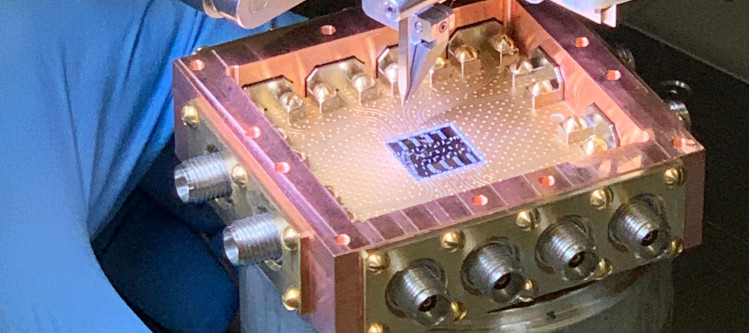Quantum Information Science and Technology

Fabricating and testing quantum-based devices, developing software and algorithms, building a prototype computer and network, and applying these innovations for breakthroughs in physics and chemistry
At Berkeley Lab, we are forging solutions to harness quantum information science and technology for discoveries that will improve our lives, from new materials to secure communications.
We’re pioneering work across the quantum research ecosystem – from theory to application – partnering with industry and academia to fabricate and test quantum-based devices, develop software and algorithms, build a prototype computer and network, and apply these innovations for breakthroughs in physics and chemistry. We also provide hands-on training for the future quantum workforce.
Quantum Materials |
Quantum Hardware |
Quantum Software and Protocols |
Quantum Communications and Networks |
Advancing Science with Quantum |
Training the Next Generation Quantum Workforce |
Berkeley Lab is home to two state-of-the-art testbeds, funded by the Department of Energy’s Office of Advanced Scientific Computing Research (ASCR): Advanced Quantum Testbed (AQT) and QUANT-NET (Quantum Application Network Testbed for Novel Entanglement Technology).
AQT is a collaborative research laboratory and open access testbed to advance quantum computing based on superconducting circuits. This program allows for deep collaborations with external users to conduct rigorous and replicable research and experiments in quantum information science theories, devices, and technologies. These interactive partnerships allow a broad exploration of cutting-edge science with systems engineering suitable for the scientific applications that rely on gate-based quantum computing.
QUANT-NET brings together world-leading expertise in quantum technologies, optics, materials, networks, testbed operations, and other assets from Berkeley Lab, UC Berkeley, and Caltech to build a software-controlled, application-focused quantum computing network between Berkeley Lab and UC Berkeley that is based on entanglement.
Berkeley Lab is also the lead institution on the Quantum Systems Accelerator (QSA), one of five National Quantum Information Science (QIS) Research Centers that brings together the technical breadth of the U.S. Department of Energy’s Office of Science to build a national QIS ecosystem that yields ground-breaking advances in computing, chemistry, medicine, control, simulation, sensing, and communication; encourages broad industry engagement; and supports the development of a diverse and inclusive workforce.
And Berkeley Lab leads ASCR’s AIDE-QC project, which focuses on developing and delivering open-source computing, programming, and simulation environments that support the large diversity of quantum computing research at the Department of Energy.







 Instagram
Instagram YouTube
YouTube